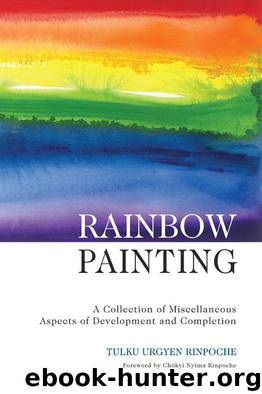Rainbow Painting: A Collection of Miscellaneous Aspects of Development and Completion by Urgyen Tulku Rinpoche

Author:Urgyen, Tulku Rinpoche [Urgyen, Tulku Rinpoche]
Language: eng
Format: azw3
ISBN: 9789627341772
Publisher: Random House Inc Clients
Published: 2011-12-13T02:00:00+00:00
MINDFULNESS
THERE ARE THE TWO TYPES OF MINDFULNESS: deliberate and effortless. By starting out with the mindfulness of deliberate attention, the practitioner can make a clear distinction between being distracted or not. Effortless mindfulness is of course possible if you happen to be one of the people of the highest caliber — the instantaneous type of person — who does not really need to go through the path. However, for most other people, especially in the Mahamudra system, the mindfulness of deliberate attention is essential in the beginning. Otherwise, by relying on only effortless mindfulness, you may not even notice whether you are distracted or not. Even worse, you may convince yourself that you are never distracted. Rather than this, it is much better to practice deliberate mindfulness even though it is subtly conceptual, and gradually progress to effortless mindfulness.
In the Mahamudra teachings, you often find the phrase “original innate nature.” This is none other than buddha nature. The training is simply to become used to that, whether you call it Mahamudra, Madhyamika or Dzogchen. These are all different words for the same natural state. But to train, you must first of all be introduced to and have recognized the view. In Mahamudra, once the practitioner has recognized the view, he or she takes mindfulness as the path; it is a way of training in that view. If mindfulness is lost, then we are led completely astray into the “black dissipation” of ordinary habitual patterns. Black dissipation means that one forgets all thought of practice and simply deviates into ordinary activities. All practice is left behind. So, either we remember the view and sustain it, or the practice is destroyed. We need to know when we are distracted. Discursive thought is distraction, but once we recognize the essence of the thought; we have arrived at nonthought. A quote from The Rain of Wisdom by Jamgön Lodrö Thaye says: “Within complexity I discovered dharmakaya; within thought I discovered nonthought.”
A person of the highest capacity can immediately arrive at effortless mindfulness. This is someone who possesses the continuity of former training from the life before this, who is reborn with a very strong aptitude for this type of practice. Needless to say, most people do not belong to that category. Most of us are not of the highest capacity, so there is no way around having to remind ourselves of the view by deliberately being mindful.
We need an intentional reminder to bring us back to the view. That which goes astray is simply our attention. Our mind becomes distracted, and that which brings us back to the view is called “deliberate mindfulness.” In the same way, if you want the light to come on in a room, a conscious act is necessary. You must put your finger on the light-switch and press it; the light doesn’t turn itself on. In the same way, unless a beginner reminds him or herself determinedly to remember the view, the recognition of mind essence never occurs. The moment we notice that we are carried away, we think, “I have wandered off.
Download
This site does not store any files on its server. We only index and link to content provided by other sites. Please contact the content providers to delete copyright contents if any and email us, we'll remove relevant links or contents immediately.
| Book of Common Prayer | Catechisms |
| Devotionals | Hymns & Hymnals |
| Meditations | Monasticism & Asceticism |
| Pentecostal & Charismatic | Prayerbooks |
| Rites & Ceremonies | Sacraments |
The Secret Power of Speaking God's Word by Joyce Meyer(3180)
More Language of Letting Go: 366 New Daily Meditations by Melody Beattie(3022)
To Light a Sacred Flame by Silver RavenWolf(2814)
How Proust Can Change Your Life by Alain De Botton(2805)
Anxious for Nothing by Max Lucado(1968)
A TIME TO KEEP SILENCE by Patrick Leigh Fermor(1898)
Curse Tablets and Binding Spells from the Ancient World by Gager John G.;(1860)
The Gnostic Gospel of St. Thomas by Tau Malachi(1793)
7 Secrets of Divine Mercy by Vinny Flynn(1741)
all by Unknown Author(1675)
365 Tao: Daily Meditations by Ming-Dao Deng(1616)
100 Days of Thanks by Thomas Nelson(1566)
From Good Goddess to Vestal Virgins: Sex and Category in Roman Religion by Ariadne Staples(1562)
To Ride a Silver Broomstick by Silver RavenWolf(1561)
Anam Cara by John O'Donohue(1555)
The Fasting Edge by Jentezen Franklin(1534)
To Stir a Magick Cauldron by Silver RavenWolf(1521)
The Sacred Enneagram by Christopher L. Heuertz(1429)
New Morning Mercies by Paul David Tripp(1389)
